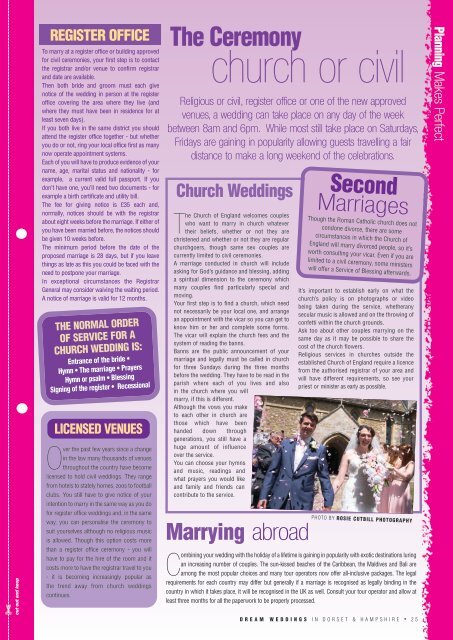Dream Weddings Magazine - Dorset & Hampshire - issue.40
Planning your wedding starts here and now and in Dream Weddings you will find tips and hints on every aspect of your big day, from the latest collections of gowns to transport, from wedding day etiquette to up-to-date fashions in flowers. You’ll also find advertisements from a whole army of local businesses, all with plenty of experience to call on. They will work with your ideas, offer creative suggestions of their own and find solutions to match every budget. They know the shortcuts and the pitfalls - and they’re fully aware of how important it is to you that everything runs smoothly. So start planning your big day. And enjoy every minute of it!
Planning your wedding starts here and now and in Dream Weddings you will find tips and hints on every aspect of your big day, from the latest collections of gowns to transport, from wedding day etiquette to up-to-date fashions in flowers. You’ll also find advertisements from a whole army of local businesses, all with plenty of experience to call on. They will work with your ideas, offer creative suggestions of their own and find solutions to match every budget. They know the shortcuts and the pitfalls - and they’re fully aware of how important it is to you that everything runs smoothly. So start planning your big day. And enjoy every minute of it!
Create successful ePaper yourself
Turn your PDF publications into a flip-book with our unique Google optimized e-Paper software.
cut out and keep<br />
REGISTER OFFICE<br />
To marry at a register office or building approved<br />
for civil ceremonies, your first step is to contact<br />
the registrar and/or venue to confirm registrar<br />
and date are available.<br />
Then both bride and groom must each give<br />
notice of the wedding in person at the register<br />
office covering the area where they live (and<br />
where they must have been in residence for at<br />
least seven days).<br />
If you both live in the same district you should<br />
attend the register office together - but whether<br />
you do or not, ring your local office first as many<br />
now operate appointment systems.<br />
Each of you will have to produce evidence of your<br />
name, age, marital status and nationality - for<br />
example, a current valid full passport. If you<br />
don’t have one, you’ll need two documents - for<br />
example a birth certificate and utility bill.<br />
The fee for giving notice is £35 each and,<br />
normally, notices should be with the registrar<br />
about eight weeks before the marriage. If either of<br />
you have been married before, the notices should<br />
be given 10 weeks before.<br />
The minimum period before the date of the<br />
proposed marriage is 28 days, but if you leave<br />
things as late as this you could be faced with the<br />
need to postpone your marriage.<br />
In exceptional circumstances the Registrar<br />
General may consider waiving the waiting period.<br />
A notice of marriage is valid for 12 months.<br />
THE NORMAL ORDER<br />
OF SERVICE FOR A<br />
CHURCH WEDDING IS:<br />
Entrance of the bride •<br />
Hymn • The marriage • Prayers<br />
Hymn or psalm • Blessing<br />
Signing of the register • Recessional<br />
LICENSED VENUES<br />
Over the past few years since a change<br />
in the law many thousands of venues<br />
throughout the country have become<br />
licensed to hold civil weddings. They range<br />
from hotels to stately homes, zoos to football<br />
clubs. You still have to give notice of your<br />
intention to marry in the same way as you do<br />
for register office weddings and, in the same<br />
way, you can personalise the ceremony to<br />
suit yourselves although no religious music<br />
is allowed. Though this option costs more<br />
than a register office ceremony - you will<br />
have to pay for the hire of the room and it<br />
costs more to have the registrar travel to you<br />
- it is becoming increasingly popular as<br />
the trend away from church weddings<br />
continues.<br />
The Ceremony<br />
church or civil<br />
Religious or civil, register office or one of the new approved<br />
venues, a wedding can take place on any day of the week<br />
between 8am and 6pm. While most still take place on Saturdays,<br />
Fridays are gaining in popularity allowing guests travelling a fair<br />
distance to make a long weekend of the celebrations.<br />
Church <strong>Weddings</strong><br />
The Church of England welcomes couples<br />
who want to marry in church whatever<br />
their beliefs, whether or not they are<br />
christened and whether or not they are regular<br />
churchgoers, though same sex couples are<br />
currently limited to civil ceremonies.<br />
A marriage conducted in church will include<br />
asking for God’s guidance and blessing, adding<br />
a spiritual dimension to the ceremony which<br />
many couples find particularly special and<br />
moving.<br />
Your first step is to find a church, which need<br />
not necessarily be your local one, and arrange<br />
an appointment with the vicar so you can get to<br />
know him or her and complete some forms.<br />
The vicar will explain the church fees and the<br />
system of reading the banns.<br />
Banns are the public announcement of your<br />
marriage and legally must be called in church<br />
for three Sundays during the three months<br />
before the wedding. They have to be read in the<br />
parish where each of you lives and also<br />
in the church where you will<br />
marry, if this is different.<br />
Although the vows you make<br />
to each other in church are<br />
those which have been<br />
handed down through<br />
generations, you still have a<br />
huge amount of influence<br />
over the service.<br />
You can choose your hymns<br />
and music, readings and<br />
what prayers you would like<br />
and family and friends can<br />
contribute to the service.<br />
Marrying abroad<br />
Second<br />
Marriages<br />
Though the Roman Catholic church does not<br />
condone divorce, there are some<br />
circumstances in which the Church of<br />
England will marry divorced people, so it’s<br />
worth consulting your vicar. Even if you are<br />
limited to a civil ceremony, some ministers<br />
will offer a Service of Blessing afterwards.<br />
It’s important to establish early on what the<br />
church’s policy is on photographs or video<br />
being taken during the service, whetherany<br />
secular music is allowed and on the throwing of<br />
confetti within the church grounds.<br />
Ask too about other couples marrying on the<br />
same day as it may be possible to share the<br />
cost of the church flowers.<br />
Religious services in churches outside the<br />
established Church of England require a licence<br />
from the authorised registrar of your area and<br />
will have different requirements, so see your<br />
priest or minister as early as possible.<br />
PHOTO BY ROSIE CUTBILL PHOTOGRAPHY<br />
Combining your wedding with the holiday of a lifetime is gaining in popularity with exotic destinations luring<br />
an increasing number of couples. The sun-kissed beaches of the Caribbean, the Maldives and Bali are<br />
among the most popular choices and many tour operators now offer all-inclusive packages. The legal<br />
requirements for each country may differ but generally if a marriage is recognised as legally binding in the<br />
country in which it takes place, it will be recognised in the UK as well. Consult your tour operator and allow at<br />
least three months for all the paperwork to be properly processed.<br />
Planning Makes Perfect<br />
D R E A M W E D D I N G S I N D O R S E T & H A M P S H I R E • 2 5
















